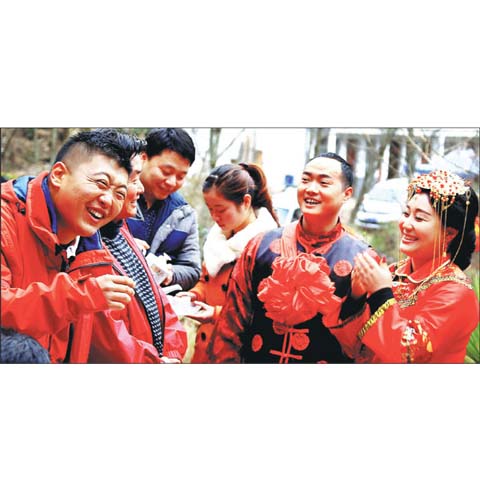Inhabitants in this isolated pocket of northwest China may not have heard of the women’s liberation movement that took Western society by storm in the 1960s. But perhaps they do not need to.
In a reversal of traditional Chinese roles between genders, women in Kangxian county, Gansu province have traditionally been dominant, with husbands assuming their wives’ surnames and living with the in-laws. If there are children, they too will take the mother’s family name.
The tradition also exists in nearby communities, such as Lueyang in neighboring Shaanxi province, says Li Wenkang, chairman of the Kangxian Federation of Literary and Art Circles.
Kangxian sits on the border with Sichuan and Shaanxi, and is deep in the mountains. Farming can be laborious work, so an influx of men ensures the survival of local families.
In this society of female dominance, women are registered as heads of families on household registration forms, not the men.
Take Liang Yan, 47, of Ningqiang
county, Shaanxi, for instance. A brick carrier on construction sites in Yangba, he married a woman in Yangba township in 1993.
His family supported his choice to move in with his bride and her family. Both look after her elderly parents, while he also grows tea and repairs houses.
He visits his home village almost every year to see his parents but he spends Chinese new year – traditionally the most important holiday for family gatherings – in Yangba.
The tradition may be linked to the area’s isolated location and the defeat of the Taiping Rebellion (1850-1864) during the Qing Dynasty (1644-1911), one of the biggest peasant uprisings in Chinese history.
Some locals believe the tradition has its roots in the defeat of a number of Taiping soldiers in neighboring Sichuan. To escape capture and execution by the ruling Qing Dynasty, some survivors escaped and hid in the isolated region. To maintain a low profile, many married and took on their wives’ names.
The tradition was at its height before the People’s Republic of China was founded in 1949.
In recent years, China’s urbanization program has seen huge numbers of young people move to big cities, so the old tradition weakened.
Categories
Gansu women rule
